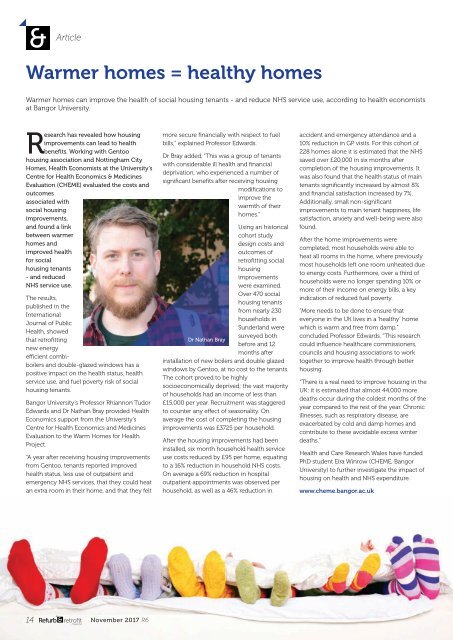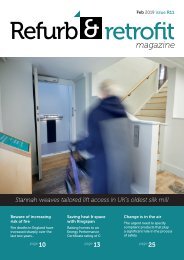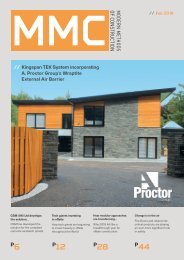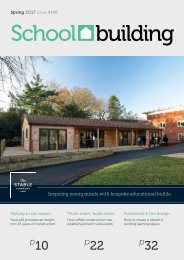You also want an ePaper? Increase the reach of your titles
YUMPU automatically turns print PDFs into web optimized ePapers that Google loves.
Article<br />
Warmer homes = healthy homes<br />
Warmer homes can improve the health of social housing tenants - and reduce NHS service use, a<strong>cc</strong>ording to health economists<br />
at Bangor University.<br />
Research has revealed how housing<br />
improvements can lead to health<br />
benefits. Working with Gentoo<br />
housing association and Nottingham City<br />
Homes, Health Economists at the University’s<br />
Centre for Health Economics & Medicines<br />
Evaluation (CHEME) evaluated the costs and<br />
outcomes<br />
associated with<br />
social housing<br />
improvements,<br />
and found a link<br />
between warmer<br />
homes and<br />
improved health<br />
for social<br />
housing tenants<br />
- and reduced<br />
NHS service use.<br />
The results,<br />
published in the<br />
International<br />
Journal of Public<br />
Health, showed<br />
that retrofitting<br />
new energy<br />
efficient combiboilers<br />
and double-glazed windows has a<br />
positive impact on the health status, health<br />
service use, and fuel poverty risk of social<br />
housing tenants.<br />
Bangor University’s Professor Rhiannon Tudor<br />
Edwards and Dr Nathan Bray provided Health<br />
Economics support from the University’s<br />
Centre for Health Economics and Medicines<br />
Evaluation to the Warm Homes for Health<br />
Project.<br />
“A year after receiving housing improvements<br />
from Gentoo, tenants reported improved<br />
health status, less use of outpatient and<br />
emergency NHS services, that they could heat<br />
an extra room in their home, and that they felt<br />
more secure financially with respect to fuel<br />
bills,” explained Professor Edwards.<br />
Dr Bray added, “This was a group of tenants<br />
with considerable ill health and financial<br />
deprivation, who experienced a number of<br />
significant benefits after receiving housing<br />
modifications to<br />
improve the<br />
warmth of their<br />
homes.”<br />
Using an historical<br />
cohort study<br />
design costs and<br />
outcomes of<br />
retrofitting social<br />
housing<br />
improvements<br />
were examined.<br />
Over 470 social<br />
housing tenants<br />
from nearly 230<br />
households in<br />
Sunderland were<br />
surveyed both<br />
Dr Nathan Bray<br />
before and 12<br />
months after<br />
installation of new boilers and double glazed<br />
windows by Gentoo, at no cost to the tenants.<br />
The cohort proved to be highly<br />
socioeconomically deprived; the vast majority<br />
of households had an income of less than<br />
£15,000 per year. Recruitment was staggered<br />
to counter any effect of seasonality. On<br />
average the cost of completing the housing<br />
improvements was £3725 per household.<br />
After the housing improvements had been<br />
installed, six month household health service<br />
use costs reduced by £95 per home, equating<br />
to a 16% reduction in household NHS costs.<br />
On average a 69% reduction in hospital<br />
outpatient appointments was observed per<br />
household, as well as a 46% reduction in<br />
a<strong>cc</strong>ident and emergency attendance and a<br />
10% reduction in GP visits. For this cohort of<br />
228 homes alone it is estimated that the NHS<br />
saved over £20,000 in six months after<br />
completion of the housing improvements. It<br />
was also found that the health status of main<br />
tenants significantly increased by almost 8%<br />
and financial satisfaction increased by 7%.<br />
Additionally, small non-significant<br />
improvements to main tenant happiness, life<br />
satisfaction, anxiety and well-being were also<br />
found.<br />
After the home improvements were<br />
completed, most households were able to<br />
heat all rooms in the home, where previously<br />
most households left one room unheated due<br />
to energy costs. Furthermore, over a third of<br />
households were no longer spending 10% or<br />
more of their income on energy bills, a key<br />
indication of reduced fuel poverty.<br />
“More needs to be done to ensure that<br />
everyone in the UK lives in a ‘healthy’ home<br />
which is warm and free from d<strong>amp</strong>,”<br />
concluded Professor Edwards. “This research<br />
could influence healthcare commissioners,<br />
councils and housing associations to work<br />
together to improve health through better<br />
housing.<br />
“There is a real need to improve housing in the<br />
UK: it is estimated that almost 44,000 more<br />
deaths o<strong>cc</strong>ur during the coldest months of the<br />
year compared to the rest of the year. Chronic<br />
illnesses, such as respiratory disease, are<br />
exacerbated by cold and d<strong>amp</strong> homes and<br />
contribute to these avoidable excess winter<br />
deaths.”<br />
Health and Care Research Wales have funded<br />
PhD student Eira Winrow (CHEME, Bangor<br />
University) to further investigate the impact of<br />
housing on health and NHS expenditure.<br />
www.cheme.bangor.ac.uk<br />
14 Refurb retrofit<br />
magazine<br />
<strong>November</strong> 20<strong>17</strong> R6

















